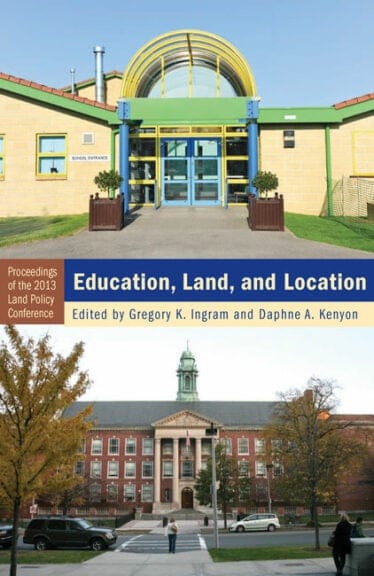Livros

Education, Land, and Location
Edited by Gregory K. Ingram and Daphne A. Kenyon
Maio 2014, inglês
Lincoln Institute of Land Policy
Because most children throughout the world attend elementary and secondary schools near their homes, where they live usually determines where they go to school. In the United States, the relationship between residential location and education has been especially strong given the dominance of local funding and local control of K–12 education. School quality varies markedly among the more than 14,000 school districts across the United States and within many of the country’s large urban districts. Housing prices reflect school quality; houses in better school districts or more advantaged neighborhoods of large districts sell at a premium. In other words, school quality is capitalized into the price of land.
The chapters in this volume explore the links between education, location, and land based on the proceedings of the 8th Annual Land Policy Conference of the Lincoln Institute of Land Policy. Three policy outcomes are the focus: academic achievement of schoolchildren; racial, ethnic, and socioeconomic segregation; and equality of opportunity, all of which have broad relevance to U.S. public policy.
The topics include the expansion of school choice, especially through charter schools and home schooling; the importance of cognitive skills for economic growth; the role of the property tax in school finance and alternative revenue sources; the structure of school districts; transportation to school; effects of school location; and housing policies that can unlink education and location.
This volume features the papers presented at the Lincoln Institute’s 8th annual Land Policy Conference in June 2013.
About the Editors
Gregory K. Ingram was the president and CEO of the Lincoln Institute of Land Policy from 2005 to 2014.
Daphne A. Kenyon is a resident fellow in tax policy at the Lincoln Institute of Land Policy.
Table of Contents
Preface, Gregory K. Ingram and Daphne A. Kenyon
1. Introduction to Education, Land, and Location, Gregory K. Ingram and Daphne A. Kenyon
Connecting Education, Land, and Location: Issues and Evidence
2. Is Location Fate? Distributional Aspects of Schooling, Eric A. Hanushek
3. School Quality, School Choice, and Residential Mobility, Eric J. Brunner
Commentary: Charles T. Clotfelter
4. The School Attendance and Residential Location Balancing Act: Community, Choice, Diversity, and Achievement, Ellen B. Goldring and Walker Swain
Commentary: Ansley T. Erickson
School District Organization and Finance
5. Not by the Hand of Horace Mann: How the Quest for Land Value Created the American School System, William A. Fischel
Commentary: Thomas Downes
6. The Future Role of the Property Tax in the Funding of K–12 Education in the United States, Andrew Reschovsky
Commentary: Ashlyn Aiko Nelson
7. Nontraditional Public School Funding Sources: Trends, Issues, and Outlook, Henry A. Coleman
Commentary: Leslie Papke
8. Transport Costs of School Choice, Kevin J. Krizek, Elizabeth J. Wilson, Ryan Wilson, and Julian D. Marshall
Commentary: Marc Schlossberg
Effects of School Location
9. Charter School Location: Evidence and Policy Implications, Robert Bifulco
Commentary: Maria Marta Ferreyra
10. Charter Schools and Minority Access to Quality Public Education, John R. Logan, Julia A. Burdick-Will, and Elisabeta Minca
Commentary: Douglas N. Harris
11. Admissions to Academy Schools in England: School Composition and House Prices, Stephen Machin and Anne West
Commentary: Parag Pathak
De-Linking Education and Location
12. Beyond “Accidents of Geography”: Using Housing Policy to Improve Access to Quality Education, Elizabeth J. Mueller and Shannon S. Van Zandt
Commentary: Deborah McKoy
13. Residential Histories, Geography of Opportunities, and Educational Achievement in the City of Santiago, Carolina Flores
Commentary: Keren Horn
14. Community Characteristics of Homeschooling: The Case of Virginia, Luke C. Miller
Commentary: Mark Berends
Keywords
Desenvolvimento Comunitário, Economia, Habitação, Governo Local, Finanças Públicas, Políticas Públicas, Regionalismo, Suburbano, Urbano, Desenvolvimento Urbano
